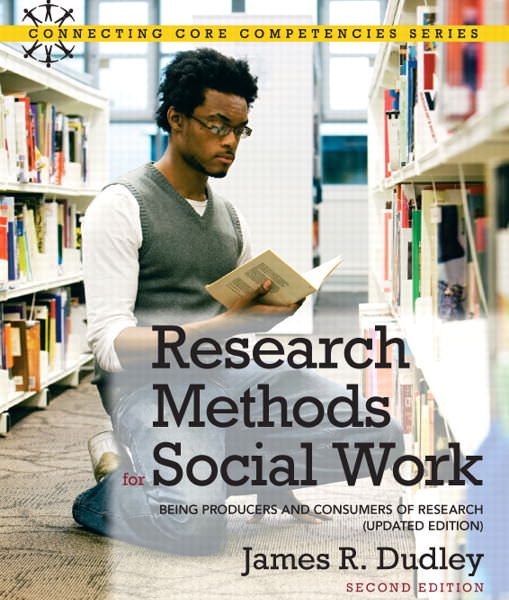Test Bank For Research Methods for Social Work: Being Producers and Consumers of Research (Updated Edition), 2/E 2nd Edition
$35.00 Original price was: $35.00.$26.50Current price is: $26.50.
Test Bank For Research Methods for Social Work: Being Producers and Consumers of Research (Updated Edition), 2/E 2nd Edition
Test Bank For Research Methods for Social Work: Being Producers and Consumers of Research (Updated Edition), 2/E 2nd Edition

Product details:
- ISBN-10 : 0205011217
- ISBN-13 : 978-0205011216
- Author: James (Jim) Dudley
With its practical and accessible writing style, Research Methods for Social Workers, 2/e, offers numerous examples from the field of social work and emphasizes how research and social work practice are connected. CSWE-mandated areas of social work are emphasized.
With over 25 years of teaching research and social work practice course, the author understands first-hand how practice and research are connected and how vital they are to each other.
Each chapter reflects and integrates the core competencies in the 2008 Educational Policy and Accreditation Standards (EPAS) set by the Council on Social Work Education (CSWE). End-of-chapter assessment reinforces this integration, and MySocialWorkLab.com activities support the mastery of CSWE’s core competencies.
Table contents:
1. Why Social Workers Need Research?
Research as a Source of Knowledge
What is Research?
The Distinctiveness of Scientific Research
Development of theory
Importance of diversity in theories
Systematic and rigorous methods
Empirical evidence
Commitment to neutrality
Obligation to an ethical code
Consumer and Producer Roles
Consumer Role
Producer Role
Using Critical Thinking Skills as Consumers and Producers
Why Do Social Work Researchers Conduct Studies?
The Research Topics of Interest to Social Workers
The Book’s Perspective about the People Who are Studied
Summary
Discussion Questions
2. The Philosophies and Purposes of Research
Inductive and Deductive Philosophies
Inductive Research
Deductive Research
Assessment of Your Philosophical Tendencies
Quantitative, Qualitative, and Mixed Methodologies
Quantitative Methods
Qualitative Methods
Mixed Methods
Some Specialized Areas in Social Work Research
Participatory Action Research
Feminist Research
Afrocentric Research
Critical Thinking and Social Work Research
Summary
Discussion Questions
3. Research Ethics and Social Work’s Mandates
Ethical Problems in Research
Physical harm
Psychological harm
Invasion of privacy
Deception of participants
Misrepresentation of findings
Balancing risks and gains
Ethical Safeguards of Research
Confidentiality
Informed Consent
Monitoring the effects of a study and offering any needed assistance
Involving research participants in decision-making
Selecting researchers without a conflict of interest
Mandates of Social Work
Adhering to the values and ethics of social work
Promoting a Commitment to Diversity
Promoting Social and Economic Justice and Special Attention to At-Risk Populations
Attending to Social Work Mandates throughout the Book
Summary
Discussion Questions
4. Understanding the Research Topic
What Issues Affect Problem Selection?
Political Perspective
Socio-Cultural Views
Professional Discipline
Specializations within social work
Personal Life Experiences
Employer Expectations, Funding Sources, and Other External Influences
Research Topics and Social Work
The Producer Role and the Research Topic
The Consumer Role and the Research Topic
The Literature Review
Tips on Completing Literature Searches
Purposes in completing a literature review
Strategies for Gathering Information
Writing up a Literature Review
Summary
Discussion Questions
5. Defining and Measuring Concepts
Concepts, Variables, Values, and Constants
Constructing and Measuring Variables
Understanding Measurement
How Knowledge is Generated
Quantitative and Qualitative Measurements
Numbers
Words from Forced-Response Questions
Word from Open-Ended Questions
Levels of Measurement
Validity and Reliability
How Is Validity Measured?
How Is Reliability Measured?
Standardized Scales
Diversity Issues
Likert Scales
Thurstone and Guttman Scales
Goal Attainment Scales for Evaluating Social Work Practice
Summary
Discussion Questions
6. Focusing a Research Study
Descriptive Studies
Exploratory Studie
Explanatory Studies
Descriptive and Exploratory Studies Ask General Research Questions
Explanatory Studies Test Hypotheses
Constructing Hypotheses
Types of Variables
Three Conditions of Causal Relationships
Practical Uses of Hypotheses
Hypothesizing to Evaluate Social Work Practice
Generating Hypotheses
Focusing a Research Study and the Consumer Role
Summary
Discussion Questions
7. Designing the Study
Review of Prior Steps
Considering Secondary Research and Existing Data
What is the Intention of the Study?
Descriptive research Designs
Exploratory Research Designs
Explanatory Research Designs
Three Key Questions
Illustration 1
Illustration 2
Designing a Study and the Consumer Role
Summary
Discussion Questions
8. Considering Sampling Techniques
Important Sampling Concepts
Selecting a Sample
Probability and Non-Probability Sampling
Types of Probability Sampling
Types of Non-Probability Sampling
Diversity, Social Justice Issues, and Samples
Using Combinations of Sampling Approaches
Sample Size
Summary
Discussion Questions
9. Constructing Surveys
Using Interviews in Research
Types of Interviews
Varying Ways to Conduct Interviews
Using Questionnaires in Research
Types of Questionnaires
Varying Ways to Administer Questionnaires
Similarities Between Data Collection in Research and Social Work
Importance of High Response Rates
Validity and Reliability Issues
Diversity and Social Justice
Comparing Interviews and Questionnaires
Interviews
Questionnaires
How to Construct a Survey
Constructing Qualitative Surveys
Summary
Discussion Questions
10. Constructing Observational Studies
Conducting Structured Observations
Conducting Unstructured Observations
Participant Observation
Non-Participatory Unstructured Observation
The Ethical Problems of Observing Covertly
Incorporating Diversity and Social Justice
Advantages of Observational Research
Validity and Reliability Issues
How to Construct an Observational Data Collection Instrument
Observing Social Artifacts and Other Non-Human Entities
Examples of Observations in Social Work Settings
Summary
Discussion Questions
11. Exploring Causal Relationships: Quasi-Experimental,
Experimental and Single System Designs
The Relevance of Causal Relationships in Social Work Practice
Claiming that the Intervention Makes a Difference
Documenting the Impact of Social Work Interventions
Group Designs for Exploring Causal Relationships
Research Designs for Exploring Causal Relationships
One-Group Posttest-Only Design
Pretest/Posttest Design
Pretest/Posttest Design with a Comparison Group
Time Series Design
Pretest/Posttest Design with a Control Group
Validity and Group Designs
Using Single System Designs for Practice Evaluations
Different Types of Single System Designs
Implementing a Single System Design
Options for Analyzing Progress for Single System Designs
Summary
Discussion Questions
12. Collecting the Data
Differences between Quantitative and Qualitative Data Collection
Training for Data Collection
Preparation for Collecting Data
Preparation for Quantitative Methods
Preparation for Qualitative Methods
Preparation for Leading Focus Groups
Considering the Influence of the Personal Characteristics of the Researcher
Collecting the Data and the Consumer Role
Summary
Discussion Questions
13. Quantitative Data Analysis
Coding the Data
Coding Questions that Directly Elicit a Numerical Response
Coding Forced-response Questions
Coding Forced-response Questions with Multiple Options
A Code Book
Ethics and Data Analysis
Descriptive Statistics for Data Analysis
Frequency Distributions
Measures of Central Tendencies
Measures of Variability or Dispersion
Bi-Variate Statistics for Data Analysis
Significance, Statistical Significance, and Statistical Tests
Measuring the Association Between Two Variables
Chi-Square Test
Correlation Test
Comparing Two or More Groups
t-test
ANOVA Test
Multivariate Statistics for Data Analysis
Mixed Methods
Working with a Data Set
Analyzing Quantitative Data and the Consumer Role
Summary
Discussion Questions
14. Qualitative Data Analysis
Qualitative Versus Quantitative Data Analysis
Varied Types of Qualitative Data
How is Qualitative Data Analyzed?
Strategy 1: Case Studies
Strategy 2: Summarizing Responses for Open-Ended Questions
How to Summarize Responses for Open-Ended Questions
Strategy 3: Theme Analysis
How to Conduct a Theme Analysis
Data Collection Approaches and the Three Strategies
Other Types of Qualitative Data Analysis
Content Analysis
Ethnographic Analysis
Observational Analysis of Social Situations
Validating Data
Mixed Methods
Analyzing Qualitative Data and the Consumer Role
Summary
Discussion Questions
15. Preparing a Report
Task A. Highlighting Background Material on the Study
Task B: Focusing the Findings
Organization of Findings
Accuracy and Clarity
Use of Graphics
Task C. Developing Recommendations
Task D: Writing or Presenting the Report
Considering Potential Readers of the Report
Contents of a Traditional Research Report
Reporting on Qualitative Studies
Reporting on the Research and the Consumer Role
Summary
Discussion Questions
16. Program and Practice Evaluation
Accountability to Stakeholders
A Political Process
Defining Evaluation
Purposes of Evaluations
Steps in Conducting an Evaluation
Planning, Implementation, and Outcome Stages
Logic Model
Evaluations during the Planning Stage
A Needs Assessment
Other Evaluation Strategies When Planning
Evaluations during the Implementation Stage
Is the Intervention Implemented as Intended?
Is the Quality of the Intervention High?
How Accessible is the Intervention to All Client Groups?
How Satisfied are the Clients with the Intervention?
Evaluations during the Outcome Stage
Group Designs
Cost/Benefit Analysis Studies
Outcomes in Practice Evaluations
Summary
Discussion Questions
People also search:
|
research methods for social work pdf
research methods for social work 8th edition pdf free
research methods for social workers pdf
research methods for generalist social work
qualitative research methods social work
|
You may also like…
Solution Manual
Modern Marketing Research Concepts Methods and Cases 2nd Edition Feinberg Solutions Manual
Test Bank
Test Bank for Methods: Doing Social Research, 4/E 4th Edition Winston Jackson, Norine Verberg
Test Bank
Test Bank for Statistics and Data Analysis for Nursing Research 2/E 2nd Edition : 0135085071












